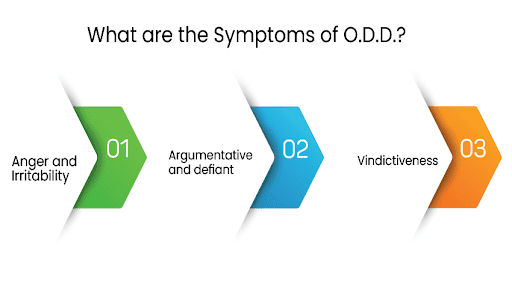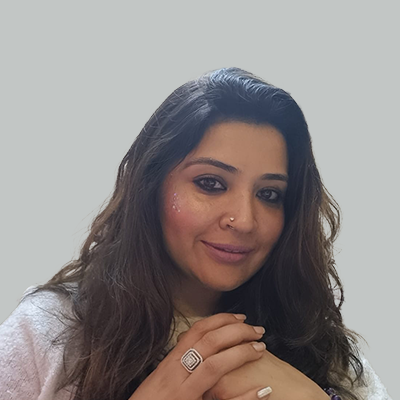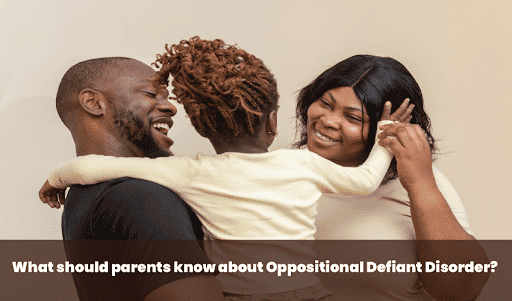Most children tend to be complex and challenging at one time or the other. However, if your child is exhibiting persistent patterns of irritability, anger, defiance, vindictiveness, or arguing with you and other authority figures, they might show oppositional Defiant Disorder (O.D.D.) symptoms.
What is Oppositional Defiant Disorder?
Oppositional Defiant Disorder (O.D.D.) is a behavioural condition. Children with O.D.D. Display a continuing pattern of defiant, uncooperative, and sometimes even hostile behaviour towards someone with authority. This kind of behaviour can often disrupt a child’s daily life and functioning and their relationship with friends and family.
While it is common for kids in their early and teenage years to be a little defiant and argumentative, if that sort of behaviour lasts for more than six months and goes beyond the behaviour exhibited by the child’s peers, it may suggest that they have O.D.D.
Research has found that around 30% of children who display signs of O.D.D. could also have other underlying behavioural conditions such as attention-deficit hyperactivity disorder (A.D.H.D.), obsessive-compulsive disorder (O.C.D.), and learning disabilities, or mood disorders.
If not correctly diagnosed and proper treatment administered, O.D.D. can continue into adulthood, causing further disruption in the individual’s life and relationships.

Our Wellness Programs
What are the Symptoms of O.D.D.?
O.D.D. is usually tricky to distinguish from a strong-willed child and overly emotional. Some common symptoms of O.D.D. are:
- Anger and Irritability
- Children who may have O.D.D. can lose their temper often and very easily
- They are easily annoyed by others and are frequently touchy
- They show signs of resentfulness and anger more than other children their age.
2. Argumentative and defiant
- Children with O.D.D. will often argue with adults and people with authority.
- They actively defy and refuse to comply with rules or requests from adults.
- These kids may deliberately upset or annoy people.
- They often try to pin their mistakes or misbehaviour on others.
3. Vindictiveness
- A child with O.D.D. can be vindictive and spiteful.
If they have shown vindictiveness or spitefulness more than twice within six months, it may be time to speak to a professional.
Most of the above symptoms of O.D.D. will first surface at home and then extend to other settings like school and friends.
Looking for services related to this subject? Get in touch with these experts today!!
Experts

Kirti Bajpai

India
Psychologist
Experience: 5 years

Neelam Parwani

India
Life Coach
Experience: 5 years

Mansi Chawla

India
Psychologist
Experience: 12 years

Sapna Zarwal

India
Psychologist
Experience: 19 years

Deepti Gandhi

India
Life Coach
Experience: 6 years
What are the causes of O.D.D.?
While the causes of O.D.D. are unclear, a combination of a child’s inherited genes and other environmental factors can result in them displaying signs of O.D.D.
1. Genetic Factors
A child’s neurobiological differences, natural disposition, and how the brain and nerves function all depend on their genetic makeup. Research suggests that a child’s genetics can account for almost 50% of O.D.D cases.
2. Biological Factors
Changes to some brain regions can also result in different mental health conditions. Doctors have also linked O.D.D. with issues with various neurotransmitters that help the nerve cells and the brain communicate. These chemicals may lead to O.D.D symptoms if they are out of order.
3. Environmental Factors
Many doctors also believe that environmental factors can be one of the leading causes of O.D.D. in kids. The chances of displaying O.D.D symptoms are higher if they have a chaotic family life or if people mistreated them during their childhood. Other factors linked to this disorder in kids are peer rejection, poverty, unstable social and economic factors, neighbourhood violence, and deviant peer groups.
What is the treatment for O.D.D.?
When diagnosed with O.D.D., the child’s treatment may depend on several factors, such as:
- The child’s age
- The severity of their symptoms
- Their ability to participate in and tolerate specific treatments
- The presence of other underlying conditions such as A.D.H.D., O.C.D., or learning disabilities.
Along with the child exhibiting signs of O.D.D., their parents, family members, and school should also be involved in their treatment for more efficient results.
O.D.D treatment can consist of one or more of the methods mentioned below.
1. Parent Management Training
It is where parents learn various means of changing their child’s behaviour with the help of positive reinforcement to promote healthy behaviour. This type of treatment may involve multiple sessions spanning several weeks.
2. Psychotherapy/Talk therapy
Various techniques help individuals identify and change troubling behaviour, thoughts, and emotions in this treatment. The most common types of this therapy are cognitive-behavioural therapy (C.B.T.) and family-focused therapy.
3. School-based intervention for O.D.D.
This kind of treatment includes using education and tools for the child’s teacher to help them improve the child’s behaviour in the classroom. They usually help prevent oppositional behaviour or worsen any existing behavioural issues.
How can parents help their children with O.D.D.?
There are several ways parents can help their children cope with O.D.D. Aside from getting them professional help, parents can also work on specific aspects of the child’s life at home.
-
Focus on the positives
Ensure to praise your child and provide positive reinforcement when they cooperate or show flexibility at home.
-
Take a break
If the conflict with your child seems to be getting worse rather than better, it may be time to take a step away. Showing your child an excellent behavioural example also helps them decide when it is time for them to step away from a negative situation.
-
Consistency
Rules are essential for children of every age. Parents must set reasonable, age-appropriate rules and expectations for their children. They should also know that poor behaviour will have consequences.
-
Self-care
Having a child with O.D.D. is difficult. Parents must maintain their interests and hobbies to enjoy themselves and practise self-care. It is also beneficial for parents to interact with other parents whose children have O.D.D. to gain support from each other.
Conclusion
Identify the signs and symptoms of O.D.D early. Give children the help they need at the right time. It can result in more effective treatment of the disorder. If you find that your child feels out of control, shows extreme signs of fear, depression, anxiety, or anger towards themselves and others, or has trouble sleeping for more than three nights. It may be time for you to consult a mental health professional for further steps you can take.
















